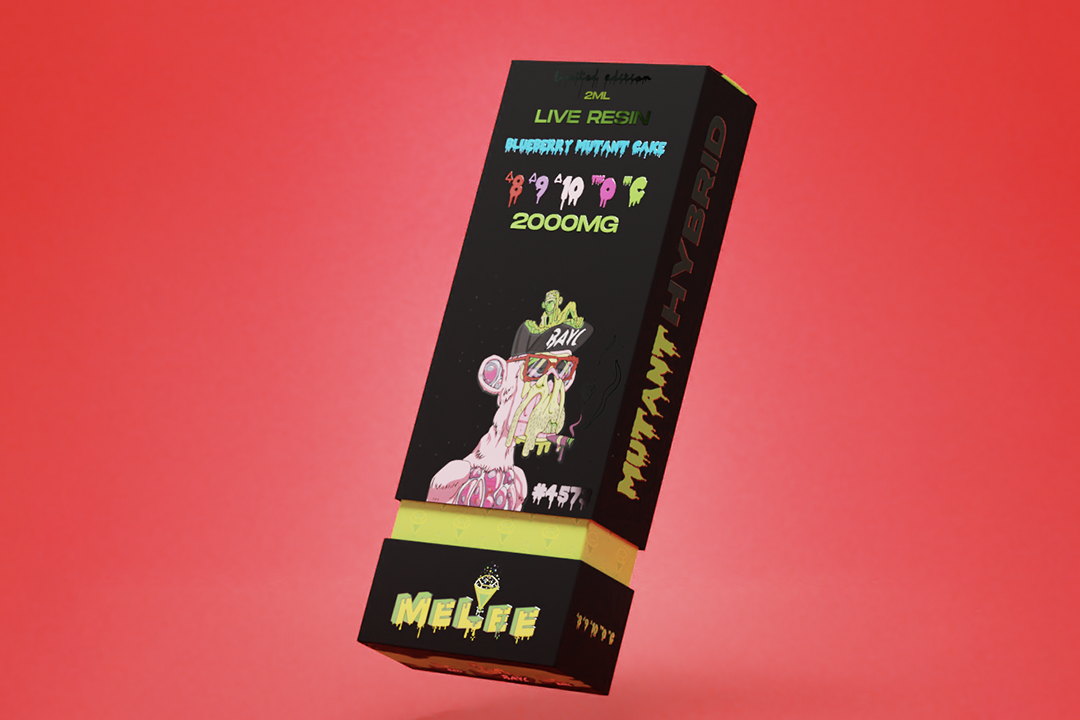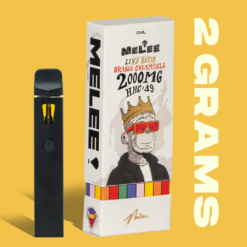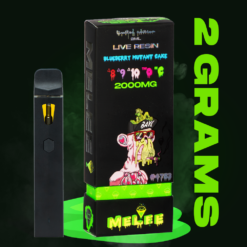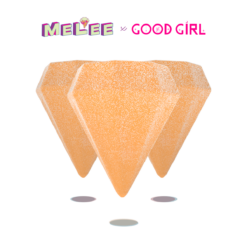By now, you’re probably familiar with some of the various compounds in this amazing plant, but today we’ll focus on two specific ones: THCA (tetrahydrocannabinolic acid) and Delta-9-THC (delta-9-tetrahydrocannabinol).
So, what’s the difference between THCA and Delta-9? In short, THCA is the non-psychoactive precursor to Delta-9-THC. When cannabis is heated through smoking, vaping, or cooking, THCA is converted into Delta-9-THC, which is the compound responsible for the plant’s psychoactive effects.
While Delta-9-THC is well-known for its ability to produce a “high,” THCA doesn’t have this effect. However, THCA is believed to have its own potential therapeutic benefits, which researchers are actively exploring.
In this article, we’ll delve deeper into how THCA compares to Delta-9-THC, examining their properties, effects, and uses. Let’s get to it.
Looking for the best Delta-9 products out there? Order our gummies or disposable vapes online!
Key Takeaways
- THCA is a non-psychoactive cannabinoid acid that forms Delta-9 when exposed to heat, light, and air.
- Delta-9 is the primary psychoactive ingredient in cannabis.
- Both compounds have potential health benefits owing to their complex interactions with receptors.
- THCA primarily binds to TRP ion channel receptors, while Delta-9 interacts with cannabinoid and non-cannabinoid receptors.
What Is THCA?
THCA is a non-psychoactive cannabinoid molecule in cannabis. Structure-wise, it resembles Delta-9 but contains a carboxyl (COOH) functional group instead of a hydroxyl (OH) group. When heated, it loses the carboxyl group and forms THC – a process called decarboxylation.
THCA occurs abundantly in live cannabis material. Once cannabis is harvested, dried, and cured, it changes into THC. As such, consuming extract from freshly harvested cannabis is the best way to take THCA.
While it may not be psychoactive, THCA appears to have several health benefits. It binds to non-cannabinoid receptors triggering broadly beneficial responses. We’ll get to these potential benefits later.
How Is THCA Made?
The process of making cannabinoids starts with two chemicals – geranyl pyrophosphate and olivetolic acid. These two react to form cannabigerolic acid or CBGA. As a result, CBGA is aptly called the “mother of all cannabinoids.”
However, if geranyl phosphate reacts with divarinolic acid, cannabigerovarinic acid (CBGVA) is formed instead. These processes take place during the second week of flowering. Essentially, CBGA and CBGVA are the main precursors in cannabis.
CBGA and CBGVA combine with specific enzymes (acid-based synthases) to form the acid forms of the primary cannabinoids, like THC, CBD, and CBC. In the case of THCA, CBGA reacts with THCA-synthase. The other possible results are CBDA and CBCA with CBDA-synthase and CBCA-synthase, respectively.
These three cannabinoid acids – THCA, CBDA, and CBCA – have the same molecular formula. However, the atoms are arranged differently, which explains their different chemical traits.
What Are The Effects Of THCA?
In its natural form, THCA is non-psychoactive. This essentially means it cannot make you high. The psychoactivity of cannabinoids, like Delta-9, comes from their interaction with the CB1 receptor. However, THCA exhibits little affinity or efficacy at this receptor hence its non-psychoactivity.
Some users claim that consuming THCA makes them feel uplifted and energized. Of course, people respond differently to cannabinoids, so such claims are subjective.
What Are The Benefits Of THCA?
THCA’s therapeutic potential is attributed to its interaction with non-cannabinoid receptors. In particular, this cannabinoid acid is shown to modulate the TRP ion channels. It also inhibits the cyclooxygenase enzymes COX1 and COX2.
As a result, researchers believe that it could have anti-inflammatory activity. Most cannabinoids are anti-inflammatory anyway, so this is not surprising. THCA’s anti-inflammatory properties may be utilized in managing inflammatory conditions.
THCA also seems to be a better anti-emetic than THC. For this reason, it is mentioned as a potential remedy for reducing nausea and vomiting.
Other potential benefits of THCA include analgesia, sleep promotion, appetite stimulation, and boosting antioxidant activity in the body. However, be reminded that THCA is unstable are promptly changes into THC when subjected to heat. Studies show “nearly unavoidable” contamination of THCA with THC, so it is difficult to attribute these benefits only to THCA.
Potential Side Effects Of THCA
Even though THCA does not get you high, it may have side effects. There are anecdotal reports that raw THCA may create drowsiness and fatigue, especially in large doses. Diarrhea and dry mouth are other possible effects of taking THCA.
There are no studies on the toxicology of THCA, perhaps due to its late emergence. However, this does not mean it does not have potential downsides. Therefore, the best way to stay safe is by taking low doses. This way, you can assess how your body responds and decide whether to continue (or stop) taking the cannabinoid.
Best Way To Take THCA
Unlike with other cannabinoids, your options of methods for taking THCA are limited. It is unstable and easily transforms into another compound when exposed to heat, light, and air. In other words, you cannot smoke or vape THCA.
So, with this in mind, what other options do you have? You could juice fresh leaves off a cannabis plant and make a raw THCA-infused drink. Oils and tinctures are other viable ways to take THCA. Transdermal patches could work too.
Edibles are another great way of taking THCA. However, care should be taken not to subject the THCA to high temperatures (above 220ᵒF) to prevent it from changing to THC. So, when making THCA edibles, jump the ‘decarbing’ step. Go for edibles that do not need heat, such as salads and dips.
What Is Delta-9?
Delta-9 THC is a psychoactive cannabinoid in cannabis. It forms when THCA decarboxylates in the presence of heat, light, and air.
Delta-9 is the main intoxicating compound in cannabis. It is also responsible for the majority of effects of strains in which it is the dominant cannabinoid. Depending on the strain’s characteristics, its concentration typically ranges between 10 and 28% in strains. For example, sativa strains tend to have higher THC levels than indicas.
The 2018 Farm Bill limits the amount of THC in hemp products to ≤ 0.3%. This is to prevent the proliferation of psychoactive products considering that Delta-9 is largely a controlled substance under the Controlled Substances Act (CSA).
How Is Delta-9 Made?
As pointed out earlier, Delta-9 is made when THCA loses the carboxyl group through decarboxylation. This happens when THCA is exposed to heat, but light and air contribute to the process.
This means that when cannabis is dried and cured, some THCA converts Delta-9 since light and air are present. However, the temperatures are usually low, so the process is slow. So, one way to increase the conversion rate is by elevating the temperature.
Another way of making Delta-9 is by isomerization. Remember, Delta-9 and CBD have the same formula. This makes it easy to turn one compound into another using simple science. Manufacturers mostly use this process to make cannabinoids like Delta-8, Delta-10, HHC, etc., which generally occur in trace amounts.
Delta-9 can also be made in this fashion; in this case, it is known as hemp-derived Delta-9. There is a clear difference between hemp-derived and hemp-extracted Delta-9. Opinion is divided on whether hemp-derived Delta-9 is legal since the FDA prohibits fully synthetic cannabinoids. But it is not fully synthetic since it is made from hemp CBD.
What Are The Effects Of Delta-9?
The most noticeable effect of Delta-9 is a head high. Users feel euphoric, amused, giggly, and relaxed in this state. Others claim their senses heighten, making them more sensitive to color, sound, taste, smell, and touch.
A cannabis high can last a few minutes to several hours, depending on the potency, user tolerance, dosage, and method of consumption. While the high is generally short-lived, cannabis can last in your system longer (several days to three months).
What Are The Benefits Of Delta-9?
One of the reasons the use of cannabis continues to grow is its recreational benefits. The majority of cannabis users cite its ability to induce relaxation, boost mood, and increase creativity, as top reasons for using it. These effects are majorly associated with Delta-9.
But this plant is also known for its plethora of health benefits. Though promising, more research is needed to validate these findings. Also, consult your doctor if you plan to supplement your medication with cannabis products.
Potential Side Effects Of Delta-9
It is not always fun and games with Delta-9. Take a little more than your system can handle, and the side effects can be unsettling. An altered sense of time, loss of coordination, slower reaction times, anxiety, red eyes, dry mouth, short-term memory loss, and headache are all possible side effects.
Long-term chronic use is associated with respiratory illnesses, psychosis, a decline in cognitive ability, and overall poor health. Avoid handling heavy machinery after taking Delta-9. Needless to say, do not operate a motor vehicle when high.
Best Way To Take Delta-9
Unlike THCA, Delta-9 is versatile and can be taken in many ways.
The most traditional way of taking Delta-9 is smoking. The dried buds and leaves are crushed into tiny pieces, rolled into joints and blunts, and then lit and smoked. However, smoking has its fair share of health risks because it contains tar and other toxic chemicals.
A newer method for taking Delta-9 is vaping. This entails using vape cartridges and pens to combust cannabis material to produce vapor for inhalation. This method is marginally safer and gentler for the lungs since it does not produce smoke. However, opinion remains divided on its safety relative to smoking.
Edibles are currently the most popular way to take Delta-9. Gummies, capsules, candies, oils, and tinctures are the go-to for many cannabis users owing to their inherent advantages. For instance, gummies are lightweight and discrete; you can easily move around and consume them without other people being any wiser. What’s more, they are available in different delicious flavors that many users enjoy.
Others, like oils, tinctures, and capsules, are one-touch products. You simply swallow and forget about them. It is the effects that remind you that you have ingested Delta-9.
Topicals have been growing in popularity in recent times, especially in sports. So, products like Delta-9-infused creams, lotions, salves, and balms are in vogue among athletes and fitness enthusiasts. These are applied to the skin and absorbed into the lower layers, where they interact with cannabinoid receptors.
Nonetheless, keep in mind that how you take Delta-9 affects the onset of effects. In terms of faster onset times, no method beats inhalation (vaping and smoking). The effects typically kick in within minutes but equally wear off quite fast.
However, edibles are the way to go if you want longer-lasting effects. The effects take a while to kick in (30-60 minutes), but they last way longer (a few hours to 12 hours). Of course, variables like potency, dosage, and user traits also play a role.
THCA vs. Delta-9: Effects
People use cannabis for different reasons that broadly fall into recreational and therapeutic categories. Delta-9 is the undisputed cannabinoid for users seeking recreational benefits. Its ability to make users high explains why cannabis is the most abused illicit substance.
Both Delta-9 and THCA have potential health benefits. However, Delta-9 appears to have a broader pharmacological profile because it can interact with cannabinoid and non-cannabinoid receptors. On the other hand, THCA has a lower affinity for cannabinoid receptors.
THCA vs. Delta-9: Potency
Of course, Delta-9 wins in this aspect hands down. It binds strongly to the CB receptors causing intoxication, among other effects. THCA is non-psychoactive, so it does not induce a high.
However, THCA is more potent than Delta-9 in some respects. For example, it seems to have stronger anti-emetic properties than Delta-9. So, it could be the better option for users with nausea and vomiting problems.
THCA vs. Delta-9: Legality
The legality of certain cannabinoids is protracted due, in part, to the ever-evolving cannabis laws. The 2018 federal Farm Bill legalized hemp and, by extension, hemp-derived products.
Both THCA and Delta-9 exist naturally in hemp and are, therefore, 100% federally legal. However, Delta-9 is highly regulated, as evidenced by the 0.3% Farm Bill limit. This means its legality is not clear-cut. In fact, in some jurisdictions, Delta-9 is completely illegal.
In states where hemp-derived Delta-9 products are legal, their THC concentrations cannot exceed 0.3% by dry weight. This rule is pretty straightforward when dealing with non-liquid products. But it becomes a problem with liquid hemp products like oils, tinctures, beverages, and even some edibles. Frequently, hemp extractors calculate the Delta-9 concentration in liquids using the mass of the product.
THCA vs. Delta-9: Cost
THCA exists naturally in abundance in live cannabis. So, it is obtained from flash-frozen freshly harvested cannabis using the cold-extraction method. There is no need to alter anything via artificial synthesis, so THCA is not costly. The only requirement is cannabis material rich in THCA (20% and above).
On the other hand, Delta-9 typically occurs in low concentrations in hemp (≤ 0.3%). But extractors can produce more can by chemically altering CBD (isomerization). While questions persist regarding the legality of this process, the resulting compound is still considered hemp-derived Delta-9.
Generally, both THCA and Delta-9 products should be easily affordable.
THCA vs. Delta-9: Which One Is Right For You?
This is the all-important question for which there is no precise answer. People use hemp products for different reasons.
Both compounds appear to possess valuable benefits if you’re looking for medicinal benefits. However, Delta-9 appears to have a broader pharmacological profile. Unfortunately for some users, it is also psychoactive and can produce adverse effects in high doses.
Moreover, people in professions where drug testing is routine should keep off Delta-9. It is unclear if THCA is any better because it easily transforms into Delta-9. So, it is probably better to keep off both cannabinoids.
Where To Buy THCA & Delta-9 Online
Most cannabis in dispensaries is decarboxylated, meaning it contains Delta-9. One sure way of getting THCA without THC is by juicing freshly harvested cannabis. Some dispensaries sell specifically designed THCA products, primarily oils, tinctures, and transdermal patches.
We at Melee Dose are still cooking up our upcoming line of diamond infused THCA pre rolls. However, we make up for that by developing a line of high-quality Delta-9 gummies and disposable vapes you will absolutely love.
Try this Orange Creamsicle Live Resin Disposable Vape made with HHC, HHCO, and Delta-9. This delicious 2-gram treat produces a rich inhale of tangy notes of ripe orange with smooth, creamy vanilla undertones and a deep satisfying wave of mind and body relaxation.
Our Wedding Cake Live Resin Disposable is another must-try. Its blend of cannabinoids includes HHC, Delta-8, Delta-9, Delta-10, and Wedding Cake strain terpenes for a truly potent yet satisfying inhale. It produces euphoric and relaxing effects that engulf the mind and body effortlessly.
And if edibles are your thing, get these White Peach Mimosa Live Resin Gummies. Masterfully crafted, our feature 20mg of HHC and 5mg of Delta-9 per gummy. These edibles are perfect for getting the mood right for toasting to a celebration.
But if you want to unwind gently after a long day, our Grape – Grandaddy Purple Gummies will not disappoint. With just 5mg of Delta-9 per gummy, these sweet berry-flavored edibles help clear and calm the mind, giving you a gentle ride into unmatched serenity.







